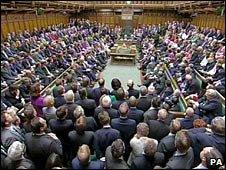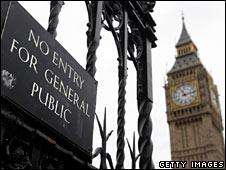Expenses watchdog under pressure from seething MPs
- Published

A new system of MPs' expenses has been brought in since the election
Appalling. Diabolical. A nightmare.
Those were some of the terms MPs used to describe the Independent Parliamentary Standards Authority (Ipsa) even before they found out it had failed to pay them their full salaries.
The 418 MPs re-elected to Parliament at the general election were each underpaid by £119.63 last month as Ipsa took over the job of paying them from the House of Commons authorities.
A spokesman for Ipsa says: "This is a technical discrepancy which often happens in switching payroll systems.
"We've already put in place the means to make up the difference. We've paid every MP even when they haven't given us their bank details and in some cases that meant hand delivering cheques."
'Very miserable'
Ipsa is keen to point out MPs did not make things easy for them. A spokesman says, at first, 230 MPs failed to give the organisation their bank details. By pay day, 50 had still not passed on the information. They were paid by cheque.
None of that will impress MPs. Most refuse to be quoted - wary of being portrayed in the newspapers as whingers - but there is real anger at Westminster about Ipsa's performance.
The former Labour Europe minister Denis MacShane says: "I've never in my 16 years seen morale so low.
"People are just very, very miserable. The rules keep chopping and changing."
They are furious about an online system for claiming expenses which many struggle to use and changes to rules which mean they have to put in claims for stationery, occasionally without success.
One MP says she has just 30 sheets of headed notepaper left, but cannot get her claims accepted when she tries to buy more. Some say they no longer have enough money to honour existing staff contracts.
Ipsa is under scrutiny. It will be the subject of a debate on Wednesday. The leader of the House of Commons Sir George Young has held a meeting with the interim chief executive Andrew McDonald.
Director resigns
The backbench Conservative 1922 committee and the Parliamentary Labour Party have passed on concerns from both sides of the House of Commons.
Next month the Committee on Standards in Public Life - whose recommendations for changes to MPs' expenses set the groundwork for the current system - will publish in its annual report a "stock take" of the situation.
There are stories of honourable members making their frustrations very clear to Ipsa staff. The organisation's interim operations director Nigel Gooding resigned, telling the Mail on Sunday he left the job for the sake of his "health and sanity", although he said he had not been hounded out by MPs.

Some MPs fear a public backlash if they complain about expenses
Some members of Parliament consider the organisation unresponsive and unhelpful. "Their helpline is an anti-helpline," says one. "No information is given, absolutely none."
In fact Ipsa has made a number of changes in MPs' favour. They had said they would pay only 85% of phone bills. They will now reimburse the full cost of calls made for parliamentary business.
Ipsa is offering interest-free advances of £4,000 to be repaid later in the financial year for members struggling with cash flow problems.
Some will be allowed to spend more on staffing and office costs for the rest of this year if they can convince Ipsa they need the money.
Calm voices suggest the problems are merely "teething troubles" that will pass in time.
MPs have to show patience, partly because they have no direct control over a body that was established to be independent, and partly because they fear a backlash from angry voters.
Administering the expenses and pay of 650 individuals and their staff is a limited task. But this group includes some of the most powerful people in the country.
They have a Parliament in which to air their concerns, a hotline to the media and a number of them are very angry.
- Published14 June 2010
- Published13 June 2010